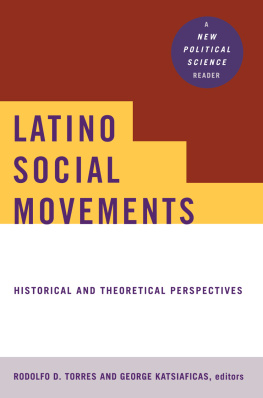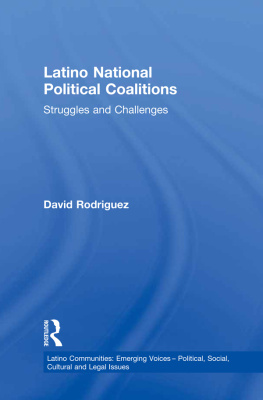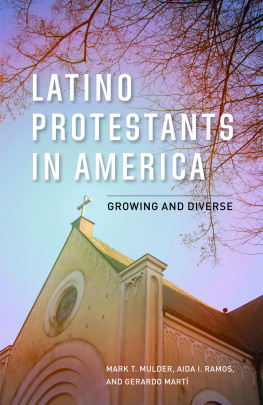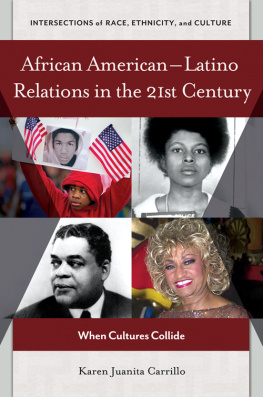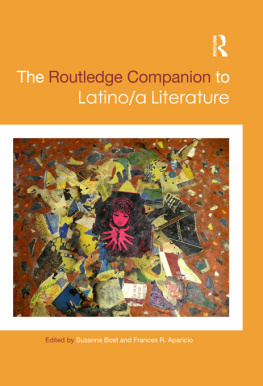Thank you for buying this ebook, published by NYU Press.
Sign up for our e-newsletters to receive information about forthcoming books, special discounts, and more!
Sign Up!
About NYU Press
A publisher of original scholarship since its founding in 1916, New York University Press Produces more than 100 new books each year, with a backlist of 3,000 titles in print. Working across the humanities and social sciences, NYU Press has award-winning lists in sociology, law, cultural and American studies, religion, American history, anthropology, politics, criminology, media and communication, literary studies, and psychology.
The Latino Body
SEXUAL CULTURES: New Directions from the Center for Lesbian and Gay Studies
General Editors: Jos Esteban Muoz and Ann Pellegrini
Times Square Red, Times Square Blue
Samuel R. Delany
Private Affairs: Critical Ventures in the Culture of Social Relations
Phillip Brian Harper
In Your Face: 9 Sexual Studies
Mandy Merck
Tropics of Desire: Interventions from Queer Latino America
Jos Quiroga
Murdering Masculinities: Fantasies of Gender and Violence in the American Crime Novel
Greg Forter
Our Monica, Ourselves: The Clinton Affair and the National Interest
Edited by Lauren Berlant and Lisa Duggan
Black Gay Man: Essays
Robert Reid-Pharr; Foreword by Samuel R. Delany
Passing: Identity and Interpretation in Sexuality, Race, and Religion
Edited by Mara Carla Snchez and Linda Schlossberg
The Explanation for Everything: Essays on Sexual Subjectivity
Paul Morrison
The Queerest Art: Essays on Lesbian and Gay Theater
Edited by Alisa Solomon and Framji Minwalla
Queer Globalizations: Citizenship and the Afterlife of Colonialism
Edited by Arnaldo Cruz-Malav and Martin F. Manalansan IV
Queer Latinidad: Identity Practices, Discursive Spaces
Juana Mara Rodrguez
Love the Sin: Sexual Regulation and the Limits of Religious Tolerance
Janet R. Jakobsen and Ann Pellegrini
Boricua Pop: Puerto Ricans and the Latinization of American Culture
Frances Negrn-Muntaner
Manning the Race: Reforming Black Men in the Jim Crow Era
Marlon B. Ross
Why I Hate Abercrombie & Fitch: Essays on Race and Sexuality
Dwight A. McBride
In a Queer Time and Place: Transgender Bodies, Subcultural Lives
Judith Halberstam
God Hates Fags: The Rhetorics of Religious Violence
Michael Cobb
Once You Go Black: Choice, Desire, and the Black American Intellectual
Robert Reid-Pharr
The Latino Body: Crisis Identities in American Literary and Cultural Memory
Lzaro Lima
The Latino Body
Crisis Identities in American Literary and
Cultural Memory
LZARO LIMA
NEW YORK UNIVERSITY PRESS
New York and London
www.nyupress.org
2007 by New York University
All rights reserved
Library of Congress Cataloging-in-Publication Data
Lima, Lzaro.
The Latino body : crisis identities in American literary and cultural memory / Lzaro Lima.
p. cm. (Sexual cultures : new directions from the Center for
Lesbian and Gay Studies)
Includes bibliographical references and index.
ISBN-13: 978-0-8147-5214-2 (alk. paper)
ISBN-10: 0-8147-5214-4 (alk. paper)
ISBN-13: 978-0-8147-5215-9 (pbk. : alk. paper)
ISBN-10: 0-8147-5215-2 (pbk. : alk. paper)
1. American literatureMexican American authorsHistory and
criticism. 2. Mexican AmericansEthnic identity. 3. Mexican AmericansHistoriography. 4. Mexican Americans in literature.
5. Chicano movement. 6. Mexican American literature (Spanish)
History and criticism. I. Title.
PS153.M4L54 2007
810.986872dc22 2007006121
New York University Press books are printed on acid-free paper,
and their binding materials are chosen for strength and durability.
Manufactured in the United States of America
c 10 9 8 7 6 5 4 3 2 1
p 10 9 8 7 6 5 4 3 2 1
A Caridad Ondina Len
y
en memoria de Lzaro Prospero Lima
y Florencio Rigoberto Gutirrez,
queridos
Acknowledgments
The body of this book and the material body that produced it were both nurtured and supported by many people and institutions. I take great pleasure in acknowledging them here. The genesis of this book was conceived at the University of Maryland, College Park, where Sandra Messinger Cypess, Regina Harrison, Phyllis Peres, Simon Richter, and Sal Sosnowski were early supporters, generous readers, and exemplary academic role models. At Maryland I was also fortunate to come in contact with scholar-teachers who provoked and reeducated me about the uses of Amrica, national belonging, and cultural memory in invaluable ways: Karen Christian, Peter Hulme, Linda Kaufmann, Jos Emilio Pacheco, Ineke Phaf, Jos Rabasa, and Beatriz Sarlo all fostered the intellectual climate that allowed me to engage the fields of American studies and Latin American literatures in ways that traditional disciplinary boundaries would have otherwise prevented.
I received important feedback on various incarnations of this book from the audiences at numerous conferences of the American Studies Association, the Latin American Studies Association, and the Modern Language Association and from invitations I received from colleagues to present my work at various institutions. I thank Shiva Balaghi at New York University, Zilkia Janer at Hofstra University, Luis Rebaza-Soraluz at Kings College, University of London, and Jennifer Spear at the University of California, Berkeley, for helping make these particular engagements so rewarding and the company so gratifying. I also received useful feedback from the editors of the Wallace Stevens Journal, where an earlier portion of first appeared, and I thank them for permission to reprint. The assistance of the librarians and staff of the Bancroft Library at the University of California, Berkeley, facilitated much of the archival work necessary to complete this book, and I especially thank Susan Snyder for securing permissions and meeting my requests with efficiency. The staff of the Beinecke Rare Book and Manuscript Library at Yale University, the National Archives and Records Administration, the Van Pelt Library at the University of Pennsylvania, and the Canaday Library at Bryn Mawr College were resourceful and unfailingly helpful with my varied inquiries and requests. Institutional and financial support came at various stages of the project from the University of Maryland, the Penn Humanities Forum at the University of Pennsylvania, and Bryn Mawr College. At Bryn Mawr, I am grateful to Provost Ralph Kuncl for providing invaluable assistance, generous support, and thoughtful advice. I also wish to thank Director of Sponsored Research Nona Smith for facilitating travel funding to several research collections. At New York University Press, I thank Jos Esteban Muoz and Ann Pellegrini, editors of the Sexual Cultures series, for supporting this project. Also at NYU Press, I have been fortunate to count on the enthusiastic support and intelligence of Eric Zinner, editorial director, as well as the remarkable efficiency of Emily Park, and Despina Papazoglou Gimbel.



